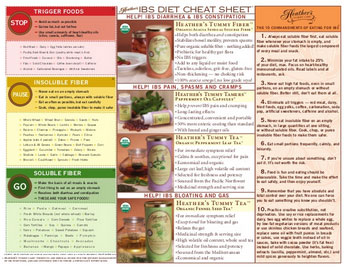X
Need Help Getting Stable from IBS Attacks? Get The IBS Diet Cheat Sheet!
Trigger Foods, Safe Foods, 10 Commandments of Eating for IBS, More. Get the emails!
We value your privacy

|
|
     Product* Product* |
Linda from BANGOR, ME Purchased on 9/11/2025 Reviewed on 12/28/2025 |
| No imitations work like this! | |
| These have helped my lower GI issues more than every other thing I have tried put together. I tried another brand when they stopped carrying it at my local health food store, but they didn't seem to help at all. I'm glad I can get them by mail! | |
Speed of Delivery     Customer Service     |
|
    Product* Product* |
Ellen from OGUNQUIT, ME Purchased on 9/25/2025 Reviewed on 10/31/2025 |
| AMAZING Customer Service | |
| I'm Canadian and I shipped the Tummy Fiber to my dad's USA vacation destination. I was concerned that the order might not arrive during his one week in the USA so I reached out to the customer service team at Heather's Tummy Care to inquire about the timing. I was super touched that I got a personal message back from Heather herself and I was really impressed with her customer service response. She ensured that my order arrived within the time window that it needed to and her message to me was full of genuine kindness and caring. One of the things that I like about Heather's Acacia Senegal fiber is that it's been tested for salicylates and it has been identified as low salicylate. This information is important to me because I have salicylate sensitivity. When I placed this order I was so happy that Heather finally had Tummy Fiber back in stock. Unfortunately when the order arrived I discovered that this first batch of fiber was milled to a finer consistency than it usually is and it's more difficult to dissolve in liquids. The letter that came with the order apologized for this situation and said that it would be a temporary change in the product. Given everything that Heather has had to go through this year in terms of sourcing this product, I feel that the altered consistency is a small sacrifice to have to deal with! I look forward to ordering more Tummy Fiber in the future, and I'm sure by then it will be back to its normal texture. | |
Speed of Delivery      Customer Service      |
|
     Product* Product* |
Jennifer from TUMWATER, WA Purchased on 9/14/2025 Reviewed on 10/25/2025 |
| Best Peppermint Tea | |
| No other peppermint tea I have tried measures up to Heather's. Certainly not the grocery store brands. :( So happy to have such a good product available though such a wonderful company. Thank you Heather! | |
Speed of Delivery     Customer Service      |
|
     Product* Product* |
Jennifer from TUMWATER, WA Purchased on 9/14/2025 Reviewed on 10/25/2025 |
| Lost Along the Way | |
| I recently ordered Heather's Tummy Fiber Travel Packets for a trip. Panic set in when I discovered I had lost the bag I was carrying them in somewhere along the way. Maneuvering airports and car rental facilities is not easy these days!! Thankfully I was able to follow all of Heather's advice for how to eat while traveling and had no major problems. However, I sure wish I had had my travel packets to set my mind at ease. Love Heather's Tummy Fiber! :) | |
Speed of Delivery     Customer Service      |
|
     Product* Product* |
Patti from ARVADA, CO Purchased on 9/20/2025 Reviewed on 10/20/2025 |
| Acacia senegal powder | |
| I LOVE this stuff! It is the most helpful of ANYTHING I have tried for dealing with my IBS. So grateful for Heather and her advocacy and the products she sells! Thank you, Heather and team. | |
Speed of Delivery     Customer Service      |
|